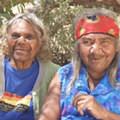|
在1950和1960年代,英國軍方在澳洲南部的沙漠進行12次大規模核子試驗。對於軍方而言,那片土地是荒原,要進行核子試驗再合適不過了;但對於已經在那邊住了上千年的原住民而言,那片土地是他們的家。

Eileen Kampakuta Brown和 Eileen Wani
Wingfield(攝影:Robert Roll)
軍方告訴原住民說試驗很安全,但結果卻是造成多人失明、深受輻射線的傷害或是致癌。而現在,半世紀以後,澳洲政府又提案要在南澳靠近烏木拉(Woomera)的地方蓋一座輻射廢棄物貯存場。這個貯存場可容納雪梨一座核子反應爐的廢棄物,也有可能還會接受其他世界各地發電廠與核子設施的廢棄物。許多原住民擔心他們的土地、水和健康有可能會再次蒙受其毒害。
為了對抗這個掩埋場的提案,Eileen Wani Wingfield和Eileen Kampakuta這兩位已經70多歲的老奶奶,連同其他5位老婦人,一起創立了Coober
Pedy婦女委員會(或是叫做Kungka Tjuta)。這個團體已多次寫信給聯邦政府,並遠至離家好幾千哩的聯邦政府所在地以表達她們的訴求。在她們反對的宣言中陳述著:「我們從我們的祖父母便學習到關於這塊土地的事情。這種學習不像白人的知識是紀錄在紙上,而是記錄在我們的腦中,而我們是發自內心在為這塊土地說話。」澳洲政府仍說他們會持續進行這項貯存場建設計畫。
Wingfield和Brown在2003年一起獲頒環保金人獎,共享六個獲獎名額中的一個,以表揚她們為終止輻射廢棄物貯存場興建計畫的努力。以下是Wingfield在舊金山接受Grist訪問的紀錄。這個獎的頒發日期是在2003年4月14日。 |
|
In the 1950s and '60s, the British military conducted a
dozen full-scale nuclear tests in the desert of southern Australia. To
the military, the region was a wasteland, the best possible place for
such a project; to the Aboriginal people who had lived in the desert for
millennia, the land was their home.

Eileen Kampakuta Brown and Eileen Wani
Wingfield.(Photo: Robert Roll)
The military told the Aboriginals that the testing was
safe, but in its wake many went blind, suffered radiation sickness, or
developed cancer. Now, half a century later, the Australian government
has proposed building a new radioactive-waste dump near Woomera, in the
state of South Australia. The dump would store waste from a nuclear
reactor in Sydney and, possibly, waste from power plants and nuclear
facilities around the world. Many Aboriginals fear that their land,
water, and health will be poisoned once again.
To fight the proposed dump, Eileen Wani Wingfield and
Eileen Kampakuta Brown, both in their 70s, joined with five other older
women to create the Coober Pedy Women's Council, or Kungka Tjuta. Their
group has written to the federal government and traveled thousands of
miles to speak against the project. "It's from our grandmothers and our
grandfathers that we've learned about the land," reads their Declaration
of Opposition. "This learning isn't written on paper as whitefellas
knowledge is. We carry it instead in our heads and we're talking from
our hearts, for the land." The Australian government says it plans to
move ahead with the project.
Wingfield and Brown shared one of this year's six
Goldman Environmental Prizes for their efforts to stop the construction
of the radioactive-waste dump. Wingfield spoke to Grist from San
Francisco, where the prizes were awarded on April 14. |
|
問:你對於1950和1960年代的核子試爆存有什麼記憶? 答:一直到事隔許久我們才漸漸瞭解事情發生的原委。我們看到軍方經過那裡,但事實上他們沒有讓任何人知道。沒有一個白人告訴我們:「人們會生病,你們要小心!」但事實上每個人都生病,而我們完全不知道理由。我的家人生病,小孩子是早產兒,應該是媽媽也生病了。一直到最近我們才恍然大悟瞭解白人對我們所做的事。
他們沒有把我們當人對待,好像我們是動物,像是狗或牛。像是我們沒有感覺。他們在我們自己的土地上殺死我們。我們還在受苦,而他們只是為了自己,而且掠奪他們在那邊所需要的一切。
在核子試爆結束以前,我只是一直在盡我的本分。我像男人一樣工作,養牛羊或任何我可作的事。我知道我們什麼都沒有,連補償金都沒有,但我們只想為了生活必需品而努力。
問:妳和其他人為何決定要對抗貯存場的建設提案?
答:我們不要在這塊土地上有貯存場,不要再回來開挖土地。那些東西已經謀殺了老一輩的人,而且當時核子試爆地點至今也還是很危險。貯存場會再度污染水源,和其他所有,包括食物、牛群還有所有依靠水生存的生物。
當白人在這裡建造貯存場或開挖土地時,會舉辦會議,但卻不會讓原住民參加。為什麼不看重人命?過去那一世代的婦女完全閉口不提此事,而如果我們也一樣,那最後大家都會死去消失。
問:這個獎項對於妳和妳團體的意義為何?
答:我完全沒有預料到。我只是一直在想我們的生活,想我們美麗乾淨的國度,想他們對於我們小孩所做的事,還有他們如何把小孩帶離人世。那是個被偷走的世代。(Grist註:在1900到1970年之間,澳洲政府從原住民媽媽身邊綁走原住民的混血兒童,把他們安置在白人的家中或營隊中,訓練他們作侍僕)
獎項對於我而言是一大驚喜,幾乎難以置信。對於獎金完全一無所知,只是希望大家可以聽到我們的聲音,聽到老弱殘疾的聲音。為了我們的健康,我們嘗試說明清楚。
問:妳計畫要如何運用這筆錢?
答:我計畫要買一輛交通工具,或是一小塊我們可以安定下來的土地。可是如果妳讓他們進來開挖或傾倒掩埋,那幹嘛要買土地?其實說我們「買」也不太對,因為我們其實原本就擁有這塊地。可是現在我們沒有權力這麼做,也沒有權力去那裡或是在那紮營,沒有權力作任何事情。
|
|
Grist: What do you remember about the nuclear testing in the desert
in the 1950s and '60s?
Eileen Wani Wingfield: We didn't know anything about it until a
long time after. We saw them [the military] going through here, but they
didn't let no one know. None of the white people said, "The people will
be getting sick; you've got to be careful." Everyone was getting sick,
and we didn't have any idea at
all why. My family got sick, you know, some of my children, [my
grandchild] was born premature. The mother must have been sick. It's
only lately we woke up as to what the white people was doing to us.
They treated us like we
weren't human, like we were just animals, like dogs or cows. Like we
didn't have feeling or anything. They killed us
on
our own land. We still are suffering. They just helped themselves to
anything, they took whatever they wanted back there.
Before they let all [the bombs] off, I did my fair
share. I worked like a man, mustering cattle and sheep, whatever I
could. When we found out [about the testing], I realized we had nothing,
didn't even get any money [in compensation]. We were just working for
tea and sugar.
Grist: Why did you and the other elders decide to fight the
proposed waste dump?
Wingfield: We don't want no waste dump
back there, no mines back there. Those things already killed all the old
people, and [the test site] is still dangerous. That dump would poison
the water and poison everything else, the food, the cattle, and
everything else that's gonna live off of the water.
When the white people have a dump or a mine, when they have a
meeting, they don't put it down to Aboriginals. Why don't they weigh the
humans? The other womens [elders of the past generation] weren't talking
about it. If we don't say anything, everybody's going to be dead and
gone.
Grist: What does this award mean for you and your group?
Wingfield: I didn't expect it at all.
All I was thinking about was our life, our lovely clean country, what
they've done to our children, how they took them away. That's a stolen
generation. [Editor's note: Between 1900 and the 1970s, the Australian
government kidnapped biracial children from their Aboriginal mothers and
placed them in camps and in white homes, where they were trained to be
servants.]
[The prize] was a shock for me, I hardly believed it. We didn't know
anything about the money, we were just wanting to be heard for the old
people, heard through the sickness. We're trying to talk about it for
our health here.
Grist: How will you spend the money?
Wingfield: I'm planning to buy a
vehicle, maybe buy a little block [of land] where we can settle down.
But if you're going to have them coming in with the mining, the dump,
why buy the land? It's wrong for us to think about buying it anyway, the
land was ours. Now we have no rights to it, no rights to go and camp on
it, no rights for anything.
|
